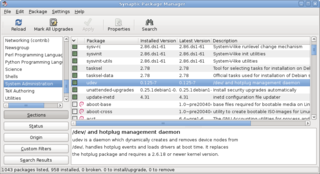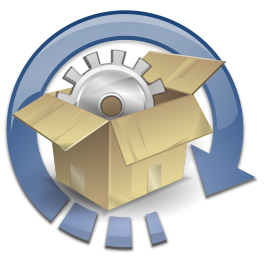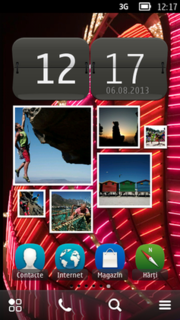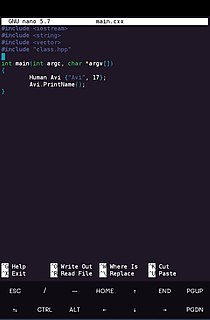Related Research Articles

An integrated development environment (IDE) is a software application that provides comprehensive facilities to computer programmers for software development. An IDE normally consists of at least a source code editor, build automation tools and a debugger. Some IDEs, such as NetBeans and Eclipse, contain the necessary compiler, interpreter, or both; others, such as SharpDevelop and Lazarus, do not.

A Linux distribution is an operating system made from a software collection that is based upon the Linux kernel and, often, a package management system. Linux users usually obtain their operating system by downloading one of the Linux distributions, which are available for a wide variety of systems ranging from embedded devices and personal computers to powerful supercomputers.

A package manager or package-management system is a collection of software tools that automates the process of installing, upgrading, configuring, and removing computer programs for a computer in a consistent manner.

Advanced package tool, or APT, is a free-software user interface that works with core libraries to handle the installation and removal of software on Debian, and Debian-based Linux distributions. APT simplifies the process of managing software on Unix-like computer systems by automating the retrieval, configuration and installation of software packages, either from precompiled files or by compiling source code.

UIQ was a software platform based upon Symbian OS, created by UIQ Technology AB. It is a graphical user interface layer that provides additional components to the core operating system, to enable the development of feature-rich mobile phones that are open to expanded capabilities through third-party applications.
Installation of a computer program, is the act of making the program ready for execution. Installation refers to the particular configuration of a software or hardware with a view to making it usable with the computer. A soft or digital copy of the piece of software (program) is needed to install it. There are different processes of installing a piece of software (program). Because the process varies for each program and each computer, programs often come with an installer, a specialised program responsible for doing whatever is needed for the installation. Installation may be part of a larger software deployment process.

Autopackage is a free computer package management system aimed at making it simple to create a package that can be installed on all Linux distributions, created by Mike Hearn around 2002.

TrueOS is a discontinued Unix-like, server-oriented operating system built upon the most recent releases of FreeBSD-CURRENT.
The Apple Developer Tools are a suite of software tools from Apple to aid in making software dynamic titles for the macOS and iOS platforms. The developer tools were formerly included on macOS install media, but are now exclusively distributed over the Internet. As of macOS 10.12, Xcode is available as a free download from the Mac App Store.
Carbide.c++ is a software development tool for C++ development on Symbian OS. It is used to develop phones that use the OS, as well as applications that run on those phones. It is based on the Eclipse IDE platform enhanced with extra plug-ins to support Symbian OS development. The product is provided by the Symbian Foundation under an open source model. In April 2009, Nokia transferred Carbide.c++ and many other software developer tools to the Symbian Foundation. Members of the Symbian community now manage and contribute code to the Carbide.c++ product.

Adobe AIR is a cross-platform runtime system currently developed by Harman International, in collaboration with Adobe Inc., for building desktop applications and mobile applications, programmed using Adobe Animate, ActionScript, and optionally Apache Flex. It was originally released in 2008. The runtime supports installable applications on Windows, macOS, and mobile operating systems, including Android, iOS, and BlackBerry Tablet OS.
SIS is an acronym that stands for Software Installation Script, the standard software installation package format for Symbian OS. SIS files are an archive, containing installation instructions, the application file, and its dependencies. By convention .sisx denotes a signed file.
.pkg (package) is a filename extension used for several file formats that contain packages of software and other files to be installed onto a certain device, operating system, or filesystem, such as the macOS, iOS, PlayStation Vita, PlayStation 3, and PlayStation 4.

Cydia is a graphical user interface of APT for iOS. It enables a user to find and install software not authorized by Apple on jailbroken iPhones, iPads and iPod touch devices. It also refers to digital distribution platform for software on iOS accessed through Cydia software. Most of the software packages available through Cydia are free of charge, although some require purchasing.

Salix OS is a multi-purpose Linux distribution based on Slackware.

Symbian is a discontinued mobile operating system (OS) and computing platform designed for smartphones. Symbian was originally developed as a proprietary software OS for PDAs in 1998 by the Symbian Ltd. consortium. Symbian OS is a descendant of Psion's EPOC, and was released exclusively on ARM processors, although an unreleased x86 port existed. Symbian was used by many major mobile phone brands, like Samsung, Motorola, Sony Ericsson, and above all by Nokia. It was also prevalent in Japan by brands including Fujitsu, Sharp and Mitsubishi. As a pioneer that established the smartphone industry, it was the most popular smartphone OS on a worldwide average until the end of 2010, at a time when smartphones were in limited use, when it was overtaken by iOS and Android. It was notably less popular in North America.
An app store is a type of digital distribution platform for computer software called applications, often in a mobile context. Apps provide a specific set of functions which, by definition, do not include the running of the computer itself. Complex software designed for use on a personal computer, for example, may have a related app designed for use on a mobile device. Today apps are normally designed to run on a specific operating system—such as the contemporary iOS, macOS, Windows or Android—but in the past mobile carriers had their own portals for apps and related media content.

Haiku is a free and open-source operating system compatible with the now discontinued BeOS.

Termux is a free and open source terminal emulator for Android which allows for running a Linux environment on an Android device. In addition, various software can be installed through the application's package manager.
References
- 1 2 3 "ToolAware PackageForge description". October 10, 2010. Archived from the original on September 14, 2010. Retrieved October 4, 2010.